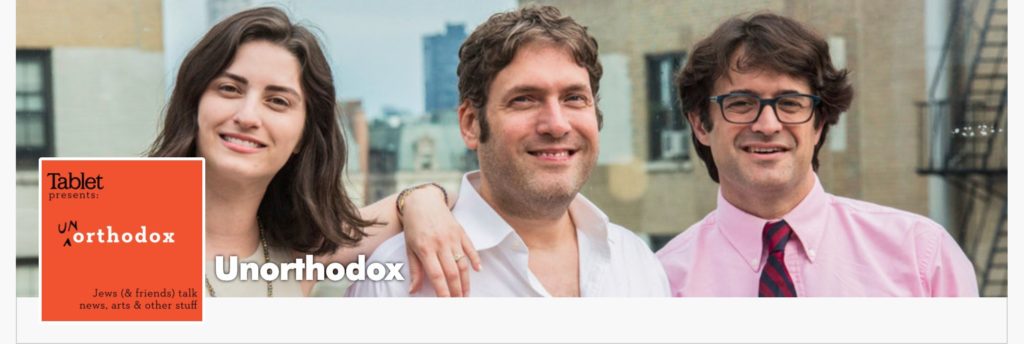(Un)Orthodox. (2015-present). Unrated. Archive: https://www.tabletmag.com/tag/unorthodox
Subscribe through iTunes
Last Saturday, a anti-semite walked into Tree of Life synagogue during services with an AK-15 and murdered eleven–a minyan plus one–Jews at morning prayers, while shouting “All Jews must die.” The (Un)Orthodox Podcast team went to Squirrel Hill in Pittsburgh PA the next day to talk, listen, pray, and grieve with the tight-knit community there, producing an episode that is a unique deviation from the their standard fare of jokes, news, advice, and information. Survivors shared stories of fear, loss, hope and love, and listening to Rabbi Jeffrey Myers from Tree of Life, leading a recitation of Baruch Dayan Ha’emet (ברוך דיין אמת – Blessed is the true judge, a traditional Hebrew expression of bereavement, sort of an equivalent to I’m sorry for your loss) was both shattering and healing. The episode has an immediacy to it that I haven’t seen replicated elsewhere, and Jewish or not, is worth a listen.
Aside from the not-unprecedented excellent humanist journalism that the cast and crew displayed last week, in general, (Un)orthdox is smart, thorough, doesn’t take itself too seriously and yet is serious in terms of accountability. (Un)Orthodox should be required listening for any prospective convert who needs to (quickly, and humorously!) be brought up to speed on what it means to be Jewish in the 21st century. As a recovering Catholic who decided last summer to start exploring Judaism, the first rabbi I met with suggested subscribing to Tablet, an online magazine of Jewish culture, and listening to (Un)orthodox alongside reading Nine Questions People Ask About Judaism by Dennis Prager and Joseph Telushkin (Simon & Schuster, 1991). He warned me that the podcast contained swearing and was sometimes irreverant, but funny and informative. I tuned in and was quickly hooked.
 Mark Oppenheimer, a New England born-and-bred professor and writer holds a PhD in religion. The “dad” of the trio, he is joined by Stephanie Butnik, editor and writer who schools him in pop music and Instagram, and Israeli-American journalist, the NRA card carrying Liel Leibowitz.
Mark Oppenheimer, a New England born-and-bred professor and writer holds a PhD in religion. The “dad” of the trio, he is joined by Stephanie Butnik, editor and writer who schools him in pop music and Instagram, and Israeli-American journalist, the NRA card carrying Liel Leibowitz.
While not prescribing to any particular movement of Judaism, the self-proclaimed Ashke-normative hosts (they’re working on it!) manage to touch on everything from keeping kosher and making homemade challah to holiday and festival observances to a taste of Hollywood gossip, while keeping listeners appraised of relevant Jewish news an culture. Episodes feature gentiles and Jews, and advocate the work of Jewish writers, comedians, chefs, filmmakers, and politicians. They don’t shy away from interviewing Jesuit priests, finding a family to invite some nuns to Shabbat dinner, discussing Israel, or making Holocaust jokes.
What I love best about (Un)orthodox is how multifaceted it can be: self-deprecating, serious and funny; informative, entertaining, and spiritual, covering tragedy and comedy, apology and atonement, the Holocaust, and Chabad alongside Gal Gadot. The storytelling is superb, the banter is engaging, and the production just keeps getting better (I started listening about a year ago to archived episodes as I waited for the next new one to be released, and have yet to meet in the middle–but I’m getting close!).
While I’m sure that a lot of things went over my head at the beginning, I had some understanding of Jewish culture and practice simply by reading widely and deeply throughout my life, so it wasn’t all completely foreign. One thing I find exciting is that I can understand the occasional Hebrew utterances now, and I feel like I am getting the inside jokes, having immersed myself in study over the last year.
Don’t think for a second that you have to be Jewish, a lapsed Jew or a convert to tune in! Non-Jews will get a exposure to a culture they may know little about and a broader understanding of the human condition. The annual “Apology” episodes are a good place to start.
Listening weekly to Mark, Stephanie, Liel, and their guests have given this shiksa a framework of reference for what it means to be Jewish, inspired me to research topics I formerly knew nothing about, and encouraged an exploration of spirituality, religion and faith.
